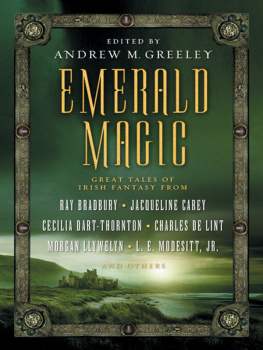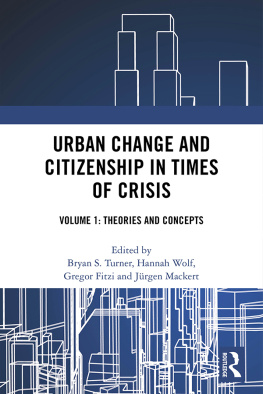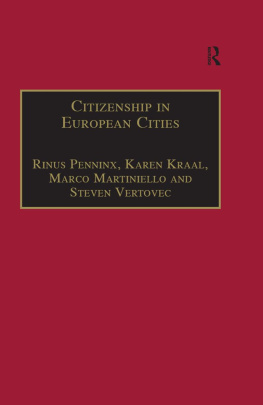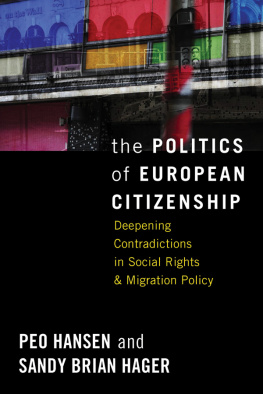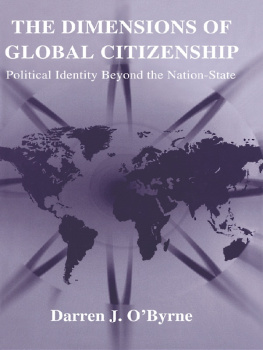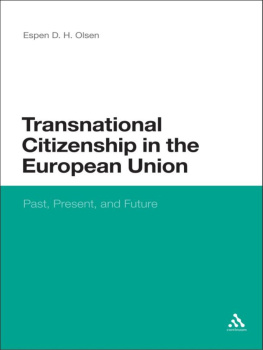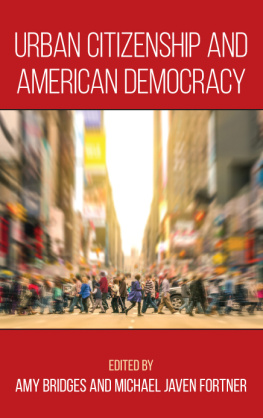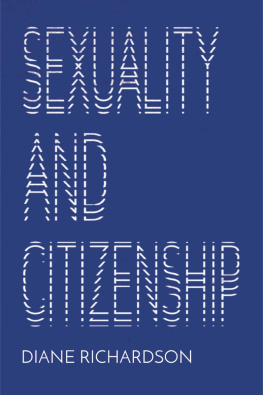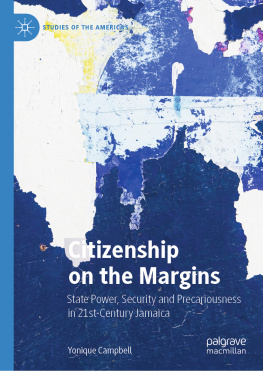REMAKING URBAN CITIZENSHIP
Remaking Urban Citizenship
Organizations, Institutions, and the Right to the City
Comparative Urban and Community Research, Volume 10
Michael Peter Smith & Michael McQuarrie, Editors
First published 2012 by Transaction Publishers
Published 2017 by Routledge
2 Park Square, Milton Park, Abingdon, Oxon OX14 4RN
711 Third Avenue, New York, NY 10017, USA
Routledge is an imprint of the Taylor & Francis Group, an informa business
Copyright 2012 by Taylor & Francis.
All rights reserved. No part of this book may be reprinted or reproduced or utilised in any form or by any electronic, mechanical, or other means, now known or hereafter invented, including photocopying and recording, or in any information storage or retrieval system, without permission in writing from the publishers.
Notice:
Product or corporate names may be trademarks or registered trademarks, and are used only for identification and explanation without intent to infringe.
Library of Congress Catalog Number: 2011041495
Library of Congress Cataloging-in-Publication Data
Remaking urban citizenship: organizations, institutions, and the right to the city /
Michael Peter Smith and Michael McQuarrie, editors.
p. cm. -- (Comparative urban and community research; v. 10)
Includes index.
ISBN 978-1-4128-4618-9
1. Sociology, Urban. 2. Citizenship. I. Smith, Michael P. II. McQuarrie, Michael.
HT151.R386 2012
307.76--dc23
2011041495
ISBN 13: 978-1-4128-4618-9 (pbk)
Contents
- 1. Remaking Urban Citizenship
Michael Peter Smith and Michael McQuarrie - 2. The Fluid, Multi-scalar, and Contradictory Construction of Citizenship
Luis Eduardo Guarnizo
- 3. Citizens in Search of a City: Towards a New Infrastructure of Political Belonging
Tony Roshan Samara - 4. Urban Citizenship in New York, Paris, and Barcelona: Immigrant Organizations and the Right to Inhabit the City
Ernesto Castaeda - 5. Rights through the City: The Urban Basis of Immigrant Rights Struggles in Amsterdam and Paris
Walter Nicholls and Floris Vermeulen
- 6. Dancing with the State: Migrant Workers, NGOs, and the Remaking of Urban Citizenship in China
Xuefei Ren - 7. Making the Case for Organizational Presence: Civic Inclusion, Access to Resources, and Formal Community Organizations
Irene Bloemraad and Shannon Gleeson - 8. The Inclusive City: Public-Private Partnerships and Immigrant Rights in San Francisco
Els de Graauw - 9. Tipping the Scale: State Rescaling and the Strange Odyssey of Chicago's Mexican Hometown Associations
William Sites and Rebecca Vonderlack-Navarro
- 10. Insistent Democracy: Neoliberal Governance and Popular Movements in Seattle
Mark Purcell - 11. Right to the City and the Quiet Appropriations of Local Space in the Heartland
Faranak Miraftab - 12. Political Moments with Long-term Consequences
Debbie Becher
Guide
We wish to thank the contributors to Remaking Urban Citizenship for reflecting upon and carefully revising their original submissions to our call for papers; their efforts have given greater coherence to this book as a whole. We owe a special thanks to our editorial assistant, Robert Saper, for the improvements he has made to each chapter of the book through his insightful editorial comments and for his excellent copy-editing of the entire manuscript. We also wish to thank Andrew McIntosh, Mary Curtis, and Irving Louis Horowitz of Transaction Publishers for their continuing support for the Comparative Urban and Community Research Book Series.
Michael Peter Smith and Michael McQuarrie
University of California, Davis
PART I
CONCEIVING AND LOCATING CITIZENSHIP
Remaking Urban Citizenship
Michael Peter Smith and Michael McQuarrie
This volume started with a basic idea. We were interested in the changing shape of citizenship, the role of cities in shaping it, and the struggles that inevitably define it. We were prompted by a growing sense that not only were scholars reassessing the meaning of citizenship in reaction to the changing ways that governance is articulated at different scales and in different institutional settings, but that the claims being made around citizenship were changing. Perhaps most visibly, there is a growing movement that specifically claims a "right to the city" that echoes discussions of critical urbanists like Henri Lefebvre (1996; 2003 [1970]). In this context, the claim to have rights is associated with membership in a city rather than a nation. These claims mobilize people on the basis of propinquity and membership in a more legally amorphous community than the nation-state. They tend to privilege multiple modes of belonging beyond legal citizenship and place of birthsuch as work, residence, and civic responsibilityas the bases of claims to rights and citizenship.
While this growing movement has received considerable scholarly attention, along with the increasingly expansive discussion of the connection between citizenship and cities (see Holston, 1999; Holston and Appadurai, 1996), it remains unclear whether these claims are able to gain much traction legally, politically, organizationally, and institutionally. Certainly, the claims are being made. In the US the massive nationwide urban protests against proposed draconian Congressional anti-immigration legislation in May 2006 is merely the most visible example. Dynamics such as changing attitudes about work, migration, and transnational subjectivities go a long way in explaining why such claims are being made. However, for us, the question is whether these changing identities and political claims matter for cities beyond simply being indicative of subjective political views. With this in mind, we decided to edit a book that would assess the degree to which new definitions of citizenship and the claims based on them were actually changing the institutional and organizational fabric of cities. Are cities becoming more inclusive in response to claims of citizenship and rights by people who might not have legal status or who might have legal status but be subjected to institutional closure?
Different nation-states and cities define group membership and exclusion in a variety of ways, and they are varyingly welcoming to strangers. This is often, and probably primarily, understood as an issue of policy. What laws define citizenship? How easy is it to realize that status? How closely is legal citizenship tied to social membership? Luis Guarnizo's chapter on the longue dure social construction of citizenship from ancient Greece to today's global system was placed at the beginning of Remaking Urban Citizenship because it calls attention to the importance of taking formal-legal citizenship as an analytical category since it is an enduring mechanism against which rights claims are made and by which, under the notion that all are equal before the law, social inequalities can be reproduced. The focal point of his argument is that "citizenship" is first and foremost a formal institution. It is a mechanism used by the state to regulate and govern those whom it includes in or excludes from membership. Much can be gained by thinking through the complexity of this relationship at various scales. As Guarnizo's chapter makes clear, the granting or withholding of citizenship has been as much a tool of state control, discipline, and governmentality (Foucault, 1988), including the governmentality of the local state, as it has been a membership institution for gaining access to rights and entitlements. His chapter supports calls for careful theorization of the political obligations as well as the political rights and entitlements of citizenship to provide a more complete picture of the making and remaking of the citizenship contract between states and citizens operating at various scales (see Smith, 2009).


